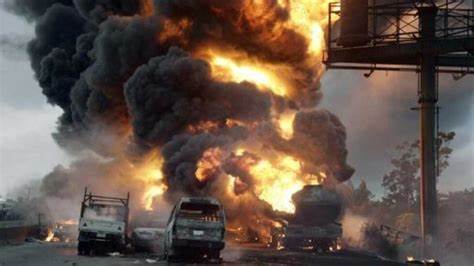On January 21, 2025, a horrific fuel truck explosion occurred in Dikko, Niger State, Nigeria, killing 86 and injuring 55 more. The incident occurred as a throng came to scavenge fuel from an overturned truck, unaware of the potential hazard. Such occurrences emphasize the necessity of public knowledge and readiness during catastrophes.
Explosions, whether caused by gasoline trucks, gas leaks, or other factors, frequently result in mayhem and major casualties. Knowing what to do in such instances can help save lives and reduce harm. Here’s a guide for citizens to respond in the event of an explosion:
- Protect yourself first; During an explosion, your safety is the most important consideration. As soon as you discover there has been a blast, check your immediate surroundings. If there is debris or flames near you, drop to the ground and cover your head to avoid flying projectiles. When it is safe to move, carefully exit the area without fleeing or causing panic. Keep an eye out for secondary threats like falling debris, fire, or more explosions, which can come unexpectedly.
- Help Others Safely; If you’re unharmed and it’s safe to help others, start by inspecting individuals around you for visible injuries. Approach with caution and focus on providing basic care, such as halting bleeding with a clean cloth or cooling burns with water. Do not move seriously injured people unless their lives are immediately threatened, such as by approaching flames. As quickly as possible, contact emergency services and offer specific information about the location and severity of the incident.
- Avoid inhaling toxic fumes; Explosions, particularly ones involving fuel or chemicals, emit toxic fumes that can impair respiration. To protect yourself, put a clean cloth or mask over your nose and mouth to keep smoke and debris out. If feasible, walk away from the source of the odors to a well-ventilated area or upwind. Inhaling harmful gasses can cause long-term health problems, therefore getting to fresh air promptly is critical.
- Don’t gather around the site; People often flock around accident scenes out of curiosity or to acquire stuff such as spilled fuel or commodities. However, this raises the possibility of harm from secondary explosions or collapsing structures. Always keep a safe distance from the site, and encourage others to do the same. Authorities and emergency responders require room to function efficiently, so exit the area immediately if directed.
- Stay informed; In the aftermath of an explosion, staying informed through credible sources is critical. Listen for updates and directions from emergency services on your phone or through the radio. Follow any safety regulations, such as evacuation orders or road closures, which are imposed to save lives. To avoid panic, don’t share unverified information.
- Be prepared for emergencies; Being prepared can help you respond more successfully during emergencies. Learn basic first aid skills, such as burn treatment and CPR, as these can be life-saving in emergency situations. Also, have an emergency kit at home or in your car with items such as a flashlight, clean water, first aid materials, and a mask. Knowing the phone numbers of local emergency agencies is very vital.
- Emotional Support and Recovery; Experiencing or watching an explosion can leave emotional wounds that require time to heal. After ensuring your physical safety, seek mental help from friends, family, or specialists. Helping others recover mentally is as vital as physical healing. Children and vulnerable individuals may require additional reassurance and care in the aftermath.
MUST READ;The Magic of Storytelling: Promoting Healthy Eating in Children
In conclusion the terrible Niger State gasoline truck explosion serves as a stark reminder of the dangers that emergencies bring, as well as the essential role that public knowledge plays in preventing more suffering. Citizens can protect themselves and others by remaining cool, avoiding danger, and acting appropriately in such situations. We can work together to create a society that is better prepared to deal with emergencies and reduce fatalities.


